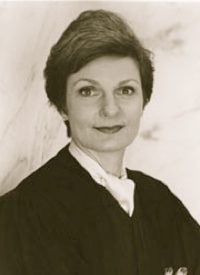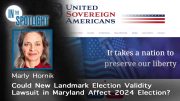
Attorneys for churches meeting in New York City public school buildings have won a court order barring the city from evicting the congregations for at least 10 days. The Alliance Defense Fund (ADF), a conservative legal advocacy group representing the churches in Bronx Household of Faith v. Board of Education of the City of New York, said that it had succeeded in getting the restraining order while a U.S. District Court considers the constitutional arguments in the case. As reported earlier in The New American, the city’s school board had banned the longtime practice of allowing churches to rent space on weekends in school buildings that would otherwise sit vacant.
Judge Loretta Preska (left) of the U.S. District Court for the Southern District of New York granted the stay, ruling that the churches affected by the ban “demonstrated irreparable harm and a likelihood of success on the merits of their Free Exercise and Establishment Clause claims.”
The implementation of the ban, that was scheduled to kick in following Sunday services February 12, would have displaced dozens of congregations that have used schools for worship over the past several years, placing many in danger of folding because of a scarcity of appropriate rental space in the city. It would also have eliminated several million dollars the city earns from rentals to the churches.
“Churches help communities,” explained ADF Senior Counsel Jordan Lorence, who had argued before the court on February 14. “Evicting churches hurts communities. Empty buildings offer nothing to communities that need hope.” He added that the court order “is a message of hope for fundamental freedoms in New York City because it means that, for the time being, the city must welcome churches as it does other groups.” He said that ADF and other attorneys would seek to win a permanent reversal of the prohibition.
Pressure against the city over its refusal to cooperate with the churches increased after the U.S. Supreme Court declined to hear the case last December. On January 12, New York police arrested 43 pastors and church members who used the occasion of Mayor Michael Bloomberg’s State of the City speech at a Bronx school to protest the ban.
In an attempt to block the ban, the New York State Senate passed a measure that would require the city to allow churches to use schools on weekends. That bill is now awaiting action in the state assembly. “This order from the court in no way should stop efforts by the New York Legislature to overturn this policy,” Lorence emphasized. “The courts have consistently ruled that the Constitution does not require New York City to ban religious worship services, so the city or the state legislature is free to repeal the policy.”
Jonathan Pines, a lawyer for the city, reacted to the court ruling, saying in a statement that he would immediately file an appeal. “After 16 years of litigation, the federal appeals court agreed with the city that worship in schools raised legitimate concerns about First Amendment violations,” Pines insisted. “This last-minute decision disrupts plans that both the city and congregations worked out months ago.”
Donna Lieberman, head of New York’s ACLU franchise, added her displeasure to the mix, complaining that “churches in New York City are holding worship services Sunday after Sunday, year after year, sending a message to both students and the community at large that the government favors these churches.”
The New York Times had quoted Mayor Bloomberg as defending the city’s actions, saying that he thought “one of the great things about America is that we keep a separation” between church and state, “and the more clear that separation is, the more those people who want to be able to practice their religion will have the opportunity to do so.”
Predictably, the churches affected by the ban were ecstatic about the ruling. Prior to the court order, Ray Parascando, pastor of Crossroads Church, told Baptist Press News, “More and more, this just smells like there’s an agenda. My concern [is] this is just the beginning of what they want to do to the religious freedoms of churches in New York.”
Afterward, with his church given at least a temporary reprieve, Parascando told the Baptist news site: “This is definitely an answer to prayer, and we look forward to future stories of victory with this situation…. It shows that there are lawmakers and judges that believe in the Constitution and the founders and framers of our country, and it’s just exciting to see that there are people who still want to uphold these truths. So I’m really happy about it.”
Fernando Cabrera, a New York City Council member as well as an area pastor who had been arrested protesting the church ban, called on state legislature “to move forward with bills that would rapidly solve this issue.” He added that the court order “is a fantastic victory and will calm the 60-plus congregations that were frantically searching for space. I commend the U.S. District Court for ruling justly.”
Looking past the 10-day temporary reprieve, the ADF’s Jordan Lorence said that the churches would continue to fight for their right to use the school space. “We’ll litigate this case as long as we have to,” he said, adding, “No other large school district in the country except for New York City has a policy like this.”



